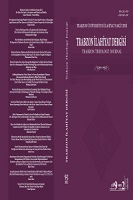Akreditasyon Sürecindeki Programlarda Yürütülen İslam Mezhepleri Tarihi Ders Kazanımlarının İAA Ölçütleri Çerçevesinde Değerlendirilmesi
Evaluation of History of Islamic Sects Course Achievements in the Programs in the Accreditation Process within the Framework of IAA Criteria
Author(s): Rifat TürkelSubject(s): Education, Theology and Religion, Islam studies
Published by: Karadeniz Teknik Üniversites - İlahiyat Fakültesi
Keywords: History of Islamic Sects; Quality; Accreditation; Islamic Sciences Accreditation Agency; IAA Criteria;
Summary/Abstract: It is known that program accreditation activities in the field of theology and Islamic Sciences in Turkey started in 2018. In these processes, which are carried out by the Islamic Sciences Accreditation Agency (IAA) within the framework of IAA Graded Assessment Key (Rubric) and IAA criteria, the achievements of the courses in the curriculum of the programs are expected to be prepared within the framework of certain criteria. There is also a History of Islamic Sects course in the curriculum of the faculty programs that are in the accreditation process. This study focuses on the module compliances as regards as the History of Islamic Sects achievements in the curriculum of theology faculty and Islamic Sciences in the accreditation process with the IAA criteria, when considering the 21st century competencies. The subject of this research is confined to the conformity of the acquisitions of the History of Islamic Sects in the IAA criteria. The compatibility of IAA outcomes and program-specific criteria with the 21st century competencies is discussed in the introduction. This makes that study more important in terms of being as an initial attempt in the field. It is thought that this study will raise awareness about the criteria expected from the courses in the programs in the accreditation process, and will guide the preparing process of course achievements of the History of Islamic Sects in particular and other modules in the curriculum in general. Having implemented a qualitative method, this study offers some spaces in the improvement in defining the workloads of undergraduate students, determining environmental factors in and out-classroom activities, specifying the appropriate measurement and evaluation methods as well as expressing the knowledge, skills and competence levels of the achievements.
Journal: Trabzon İlahiyat Dergisi
- Issue Year: 9/2022
- Issue No: 2
- Page Range: 404-438
- Page Count: 35
- Language: Turkish

